Specialized Treatments
Ayurvedic specialized treatments refer to therapeutic procedures and interventions that are designed to address specific health conditions or concerns with a targeted and individualized approach.
1. Arthritis
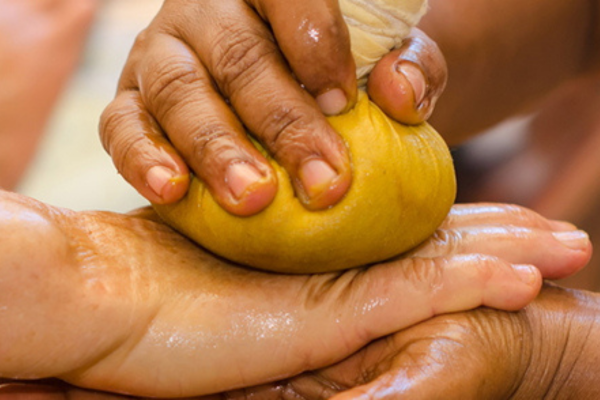
Arthritis Ayurvedic treatment involves a holistic approach that aims to address the underlying imbalances in the body contributing to arthritis symptoms. Ayurveda, the ancient Indian system of medicine, views arthritis as a manifestation of an imbalance in the body’s doshas (bioenergetic forces) and aims to restore harmony through various therapies
Benefits :
- Pain Relief: Ayurvedic therapies can help alleviate joint pain and discomfort associated with arthritis.
- Reduced Inflammation: Herbal remedies and Panchakarma treatments have anti-inflammatory properties that help reduce swelling and inflammation in the joints.
- Improved Joint Function: By promoting flexibility, mobility, and lubrication in the joints, Ayurvedic treatments can improve joint function and range of motion.
- Enhanced Quality of Life: Effective management of arthritis symptoms can lead to a better quality of life, allowing individuals to perform daily activities with greater ease and comfort.
- Holistic Approach: Ayurveda addresses arthritis from a holistic perspective, taking into account the individual’s overall health, lifestyle, and emotional well-being.
2. Migraine
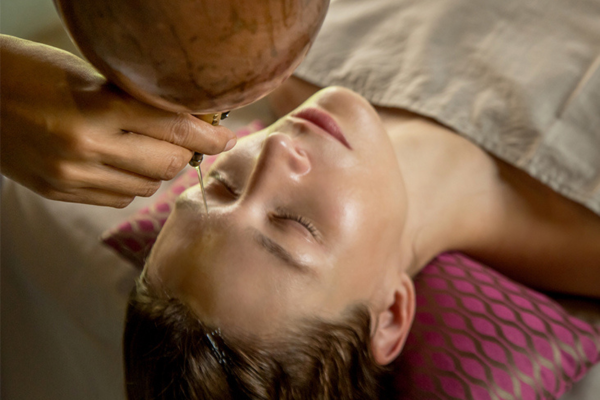
Ayurvedic treatment for migraines involves a holistic approach aimed at addressing the root causes of the condition and providing relief from symptoms.
Benefits :
- Natural Relief: Utilizes natural herbs and therapies to minimize synthetic medications and potential side effects.
- Reduced Frequency and Severity: Aims to decrease the occurrence and intensity of migraine attacks over time.
- Improved Symptom Management: Helps alleviate migraine symptoms such as pain, nausea, and sensitivity to light and sound.
- Stress Reduction: Includes stress-reducing techniques like yoga and meditation to prevent migraine triggers.
- Balanced Doshas: Targets imbalances in Pitta and Vata doshas, crucial factors in migraine development.
3. Menstrual Problem
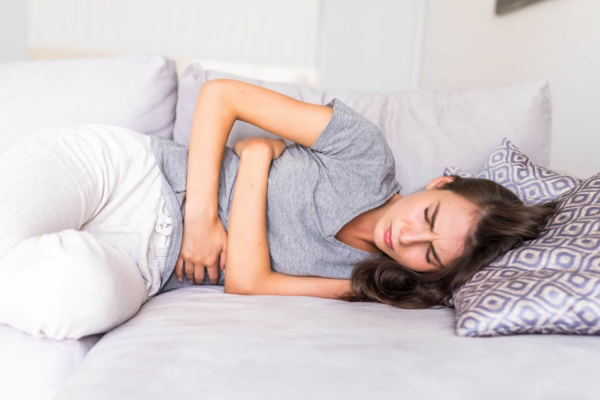
In Ayurveda, menstrual problems are often attributed to imbalances in the body’s doshas, particularly Vata and Pitta. Menstrual problems encompass a range of issues related to menstruation, including irregular periods, heavy bleeding, painful periods (dysmenorrhea), and other menstrual disorders. Ayurvedic treatment for menstrual problems aims to restore balance to the doshas and alleviate symptoms.
Benefits
- Regulation of menstrual cycles
- Reduction in menstrual pain and discomfort
- Balancing of hormones
- Improvement in overall reproductive health
- Reduction in PMS symptoms
- Prevention of complications associated with menstrual disorders
4. Menopause
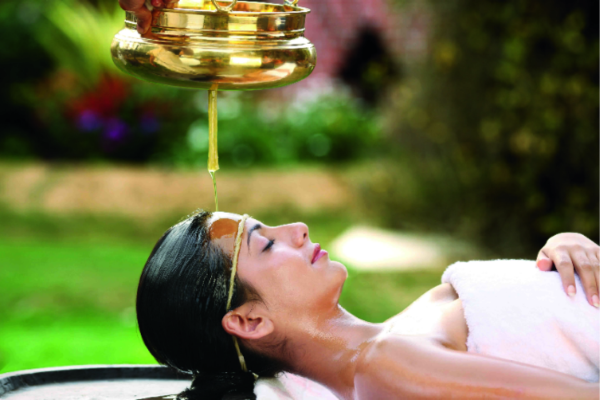
Ayurvedic treatment for menopause offers a comprehensive approach to managing the physical, emotional, and hormonal changes that occur during this transitional phase in a woman’s life.
Benefits
- Reduction in menopausal symptoms such as hot flashes, night sweats, mood swings, insomnia, vaginal dryness, and fatigue
- Improved hormonal balance and regulation of estrogen and progesterone levels
- Support for overall health and vitality during the menopausal transition
- Promotion of emotional balance, mental clarity, and stress resilience
- Enhancement of sleep quality, energy levels, and physical well-being
- Prevention of long-term health complications associated with hormonal imbalances and menopausal symptoms
- Promotion of healthy aging, longevity, and quality of life during and after menopause
5. Stress Relief
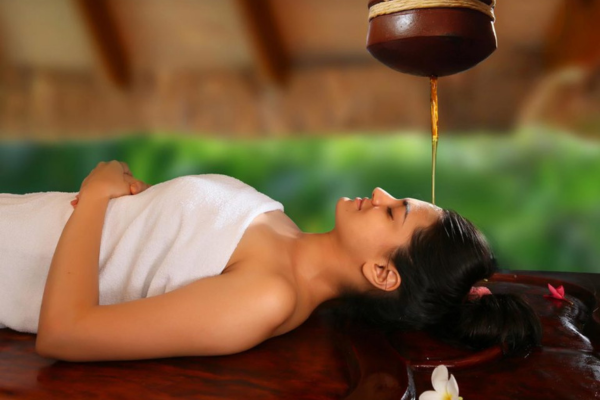
Stress relief through Ayurveda involves a holistic approach that addresses the root causes of stress and aims to restore balance to the body, mind, and spirit. Ayurvedic treatments for stress relief incorporate various natural therapies, lifestyle modifications, and herbal remedies to promote relaxation, calmness, and overall well-being.
Benefits
- Reduction in stress levels and related symptoms such as anxiety, tension, and fatigue.
- Promotion of relaxation, calmness, and emotional balance.
- Improvement in sleep quality, mental clarity, and concentration.
- Enhancement of overall well-being and resilience to stress.
- Support for the nervous system and adrenal glands, helping the body adapt to stressors more effectively.
- Prevention of long-term health complications associated with chronic stress, such as hypertension, digestive disorders, and immune dysfunction.
6. Diabetes

Diabetes is a chronic metabolic disorder characterized by high blood sugar levels (hyperglycemia) resulting from the body’s inability to produce enough insulin or effectively use insulin. Insulin is a hormone produced by the pancreas that helps regulate blood sugar levels and allows glucose to enter cells for energy production.
Ayurvedic treatment for diabetes focuses on addressing the root causes of the condition and restoring balance to the body’s systems.
Benefits
- Regulation of blood sugar levels and prevention of hyperglycemia
- Improvement in insulin sensitivity and secretion
- Protection of the pancreas from damage and degeneration
- Reduction in diabetes-related complications such as neuropathy, nephropathy, and retinopathy
- Promotion of overall health and well-being, including weight management and cardiovascular health
- Enhancement of energy levels, vitality, and quality of life in diabetes
7. PCOS

Polycystic Ovary Syndrome (PCOS) is a common hormonal disorder that affects individuals with ovaries, typically during their reproductive years. PCOS is characterized by irregular menstrual cycles, excess androgen (male hormone) levels, and polycystic ovaries, which are ovaries containing numerous small cysts. Symptoms of PCOS can vary widely and may include irregular periods, excessive hair growth (hirsutism), acne, weight gain, and difficulty conceiving.
Ayurvedic treatment for PCOS focuses on addressing the underlying hormonal imbalances and promoting overall health and well-being.
Benefits
- Regulation of menstrual cycles and promotion of ovulation
- Reduction in symptoms associated with PCOS such as irregular periods, acne, hirsutism, and weight gain
- Enhancement of insulin sensitivity and mitigation of insulin resistance.
- Support for ovarian function and hormone production
- Reduction in PCOS-related complications such as infertility, cardiovascular disease, and metabolic syndrome
- Promotion of overall health, well-being, and fertility in PCOS
8. PCOD
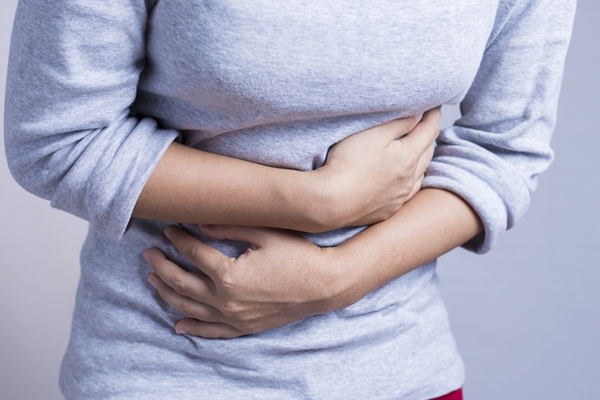
Polycystic Ovary Disorder (PCOD), also known as Polycystic Ovary Syndrome (PCOS), is a common hormonal disorder characterized by enlarged ovaries with small cysts on the outer edges. PCOD affects individuals with ovaries, often during their reproductive years, and can lead to irregular menstrual cycles, excess androgen (male hormone) levels, and various symptoms like acne, hirsutism (excessive hair growth), weight gain, and difficulty conceiving.
Ayurvedic treatment for PCOD focuses on addressing the underlying hormonal imbalances and promoting overall well-being.
Benefits
- Regulation of menstrual cycles and promotion of ovulation
- Reduction in symptoms associated with PCOD such as irregular periods, acne, hirsutism, and weight gain
- Enhancement of insulin sensitivity and mitigation of insulin resistance.
- Support for ovarian function and hormone production
- Reduction in PCOD-related complications such as infertility, cardiovascular disease, and metabolic syndrome
- Promotion of overall health, well-being, and fertility in PCOD
9. Gangrene
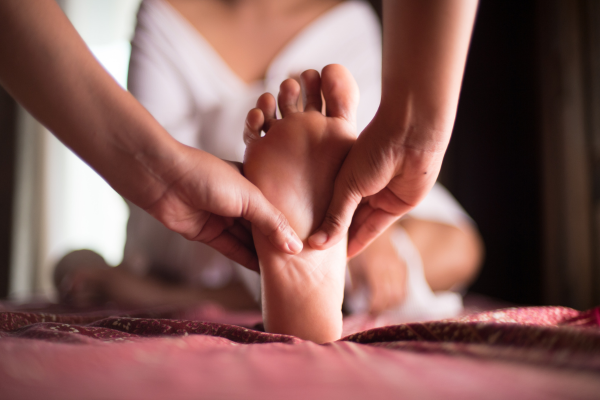
Gangrene is a serious medical condition that occurs when a part of the body loses its blood supply, leading to tissue death. It can result from various factors, including infection, injury, diabetes, peripheral artery disease, or compromised circulation. Gangrene can affect any part of the body but commonly occurs in the extremities, such as the toes, fingers, hands, or feet. Symptoms of gangrene include severe pain, swelling, discoloration, and the formation of a foul-smelling discharge.
Ayurvedic treatment for gangrene aims to address the underlying causes, improve circulation, promote tissue healing, and prevent further deterioration of affected tissues.
Benefits
- Promotion of tissue healing and regeneration
- Reduction in infection and inflammation
- Improvement in circulation and blood flow to affected tissues
- Alleviation of pain and discomfort associated with gangrene
- Prevention of further tissue necrosis and spread of infection
- Support for overall health and well-being during recovery
10. Skin Allergies
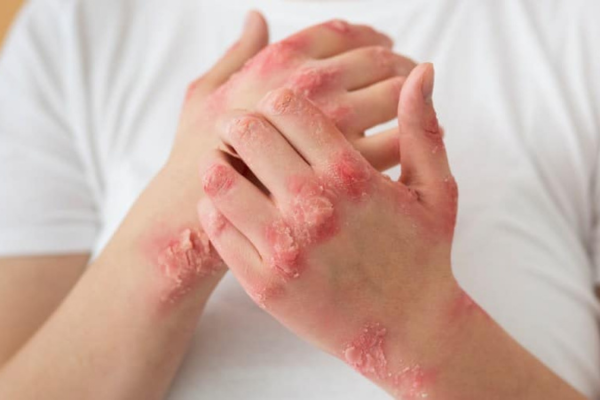
Skin allergies, also known as allergic dermatitis or eczema, occur when the skin reacts to certain substances, known as allergens. Common allergens include pollen, pet dander, certain foods, insect bites, chemicals, and certain fabrics. Skin allergies can manifest as redness, itching, swelling, rash, dryness, or blistering, depending on the severity of the reaction and the individual’s sensitivity to the allergen.
Ayurvedic treatment for skin allergies focuses on addressing the underlying imbalances in the body, strengthening the immune system, and soothing the skin.
Benefits
- Reduction in inflammation, itching, and redness of the skin
- Soothing and moisturizing of dry, irritated skin
- Strengthening of the immune system and reduction in allergic reactions
- Promotion of overall skin health and vitality
- Prevention of recurrent flare-ups and chronic skin conditions
- Improvement in quality of life and well-being
11. Joint Pain

Joint pain, also known as arthralgia, is discomfort, soreness, or inflammation in any of the body’s joints. It can be caused by various factors, including injury, overuse, arthritis, autoimmune diseases, infection, or age-related wear and tear. Joint pain can range from mild to severe and can affect one or multiple joints throughout the body, including the knees, hips, shoulders, elbows, wrists, and ankles.
Ayurvedic treatment for joint pain aims to alleviate pain and inflammation, improve joint mobility and flexibility, and address the underlying imbalances in the body.
Benefits
- Reduction in pain, swelling, and inflammation in the joints
- Improvement in joint mobility, flexibility, and range of motion
- Strengthening of the muscles and tissues surrounding the joints
- Promotion of tissue repair and regeneration
- Prevention of joint degeneration and progression of arthritis
- Enhancement of overall joint health and well-being
12. Back Pain

Back pain is a common ailment characterized by discomfort, stiffness, or tension in the muscles, ligaments, nerves, or vertebrae of the back. It can range from mild to severe and may be acute (short-term) or chronic (lasting more than three months). Back pain can be caused by various factors, including muscle strain, poor posture, injury, herniated discs, arthritis, osteoporosis, or spinal abnormalities.
Ayurvedic treatment for back pain aims to alleviate pain and discomfort, improve flexibility and mobility, strengthen the muscles and ligaments of the back, and address the underlying imbalances in the body.
Benefits
- Reduction in pain, stiffness, and discomfort in the back
- Improvement in flexibility, mobility, and range of motion
- Strengthening of the muscles and ligaments supporting the spine
- Promotion of tissue repair and regeneration
- Prevention of recurrent episodes of back pain
- Enhancement of overall back health and well-being
13. Knee Pain
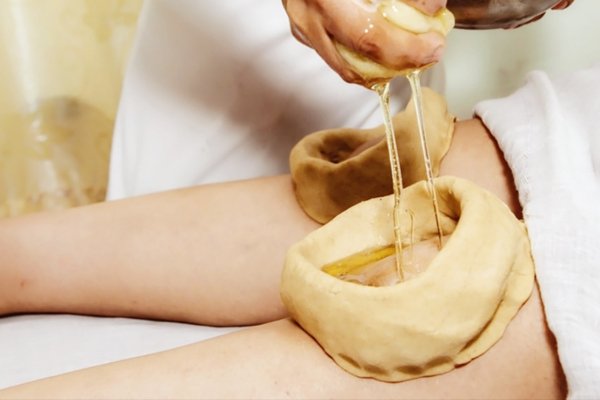
Knee pain is a common condition characterized by discomfort, soreness, or inflammation in and around the knee joint. It can be caused by various factors, including injury, overuse, arthritis, ligament or tendon damage, obesity, or degenerative changes associated with aging. Knee pain can range from mild to severe and may be accompanied by swelling, stiffness, weakness, or difficulty bearing weight on the affected knee.
Ayurvedic treatment for knee pain aims to alleviate pain and inflammation, improve joint mobility and function, strengthen the muscles and ligaments supporting the knee, and address the underlying imbalances in the body.
Benefits
- Reduction in pain, swelling, and inflammation in the knee joint
- Improvement in flexibility, mobility, and range of motion
- Strengthening of the muscles and ligaments supporting the knee
- Promotion of tissue repair and regeneration
- Prevention of recurrent episodes of knee pain
- Enhancement of overall knee joint health and well-being
14. Thyroid
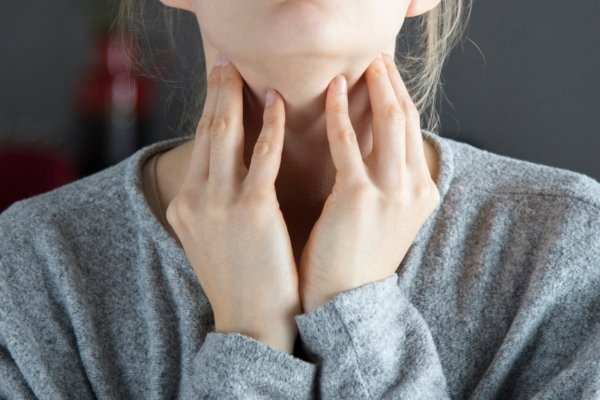
Thyroid is a gland located in the front of the neck, responsible for producing hormones that regulate metabolism, growth, and development in the body. Thyroid disorders occur when the thyroid gland produces either too much hormone (hyperthyroidism) or too little hormone (hypothyroidism), disrupting the body’s normal functioning.
Ayurvedic treatment for thyroid disorders aims to balance the doshas (energetic forces) in the body, improve thyroid function, and alleviate symptoms associated with hyperthyroidism or hypothyroidism.
Benefits
- Regulation of thyroid function and hormone levels
- Reduction in symptoms associated with hyperthyroidism or hypothyroidism, such as fatigue, weight gain or loss, hair loss, constipation, and mood swings
- Support for overall metabolic health and energy production
- Enhancement of vitality, well-being, and quality of life in thyroid disorders
- Prevention of thyroid-related complications, such as goiter, thyroid nodules, and thyroid cancer
15. Hyper Tension
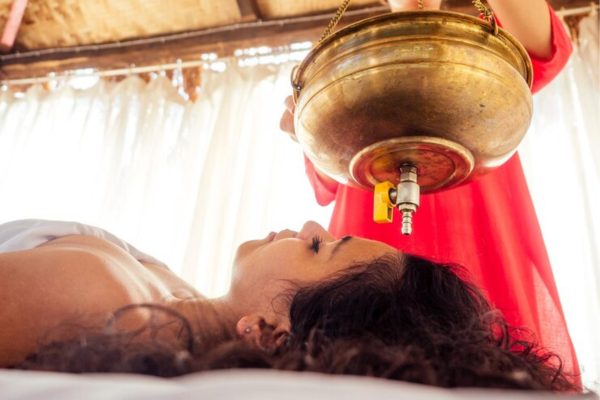
Hypertension, commonly known as high blood pressure, is a medical condition characterized by elevated pressure in the arteries. It’s a significant risk factor for cardiovascular diseases such as heart attack, stroke, and heart failure. Ayurvedic treatment for hypertension focuses on balancing the doshas (energetic forces) in the body, promoting overall health, and reducing stress.
Benefits
- Reduction in blood pressure levels and cardiovascular risk factors
- Improvement in overall cardiovascular health and circulation
- Reduction in stress, anxiety, and tension
- Promotion of relaxation, mental clarity, and emotional well-being
- Enhancement of vitality, energy, and quality of life in hypertension
- Prevention of hypertension-related complications, such as heart attack, stroke, and kidney disease
16. Neuropathic Pain
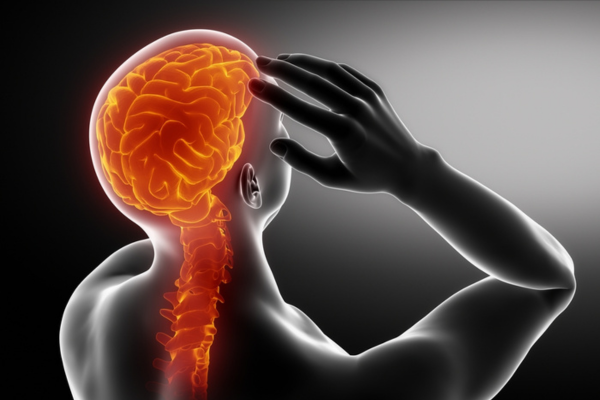
Neuropathic pain, classified as chronic, arises from dysfunction or injury to the nervous system. It can result from conditions such as diabetic neuropathy, postherpetic neuralgia (shingles), nerve compression or injury, multiple sclerosis, and certain medications or treatments. Neuropathic pain is often described as burning, tingling, shooting, or stabbing sensations, and it can significantly impact a person’s quality of life.
Ayurvedic treatment for neuropathic pain aims to address the underlying imbalances in the body, support nerve regeneration, reduce pain and inflammation, and improve overall nerve health.
Benefits
- Reduction in pain intensity and frequency
- Improvement in nerve function and regeneration
- Reduction in inflammation and oxidative stress
- Promotion of relaxation, mental clarity, and emotional well-being
- Enhancement of overall nerve health and quality of life
- Prevention of neuropathic pain-related complications, such as depression, anxiety, and sleep disturbances
17. Insomnia
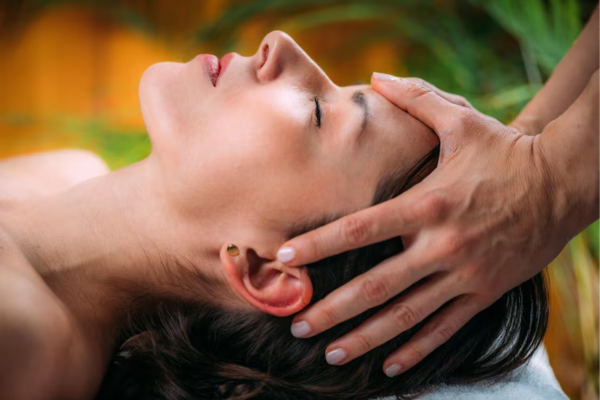
Insomnia, classified as a sleep disorder, manifests as challenges in initiating sleep, maintaining sleep, or achieving restorative sleep, even when sufficient opportunity for rest is available.. It can lead to daytime fatigue, irritability, difficulty concentrating, and impaired functioning. Ayurvedic treatment for insomnia focuses on addressing the underlying imbalances in the body, promoting relaxation, and improving sleep quality.
Benefits
- Reduction in sleep onset latency (time taken to fall asleep)
- Improvement in sleep duration and quality
- Reduction in nighttime awakenings and disturbances
- Promotion of relaxation, mental clarity, and emotional well-being
- Enhancement of overall sleep hygiene and sleep satisfaction
- Prevention of insomnia-related complications, such as daytime fatigue, mood disturbances, and impaired functioning
18. Paralysis
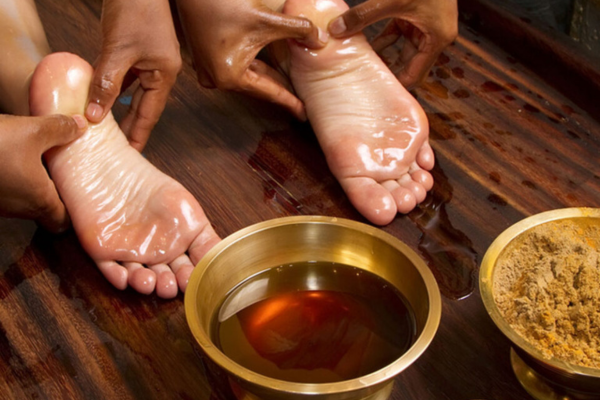
Paralysis refers to the loss of muscle function in a part of the body, often caused by damage to the nervous system. It can be temporary or permanent and may affect one or more muscles, resulting in partial or complete loss of movement and sensation in the affected area. Ayurvedic treatment for paralysis aims to restore mobility, improve muscle strength and coordination, and address the underlying imbalances in the body.
Benefits
- Improvement in muscle strength, coordination, and mobility
- Reduction in muscle stiffness, spasticity, and pain
- Promotion of nerve regeneration and repair
- Enhancement of overall physical function and independence
- Prevention of complications, such as muscle atrophy, contractures, and pressure sores
- Improvement in quality of life and well-being for individuals with paralysis
